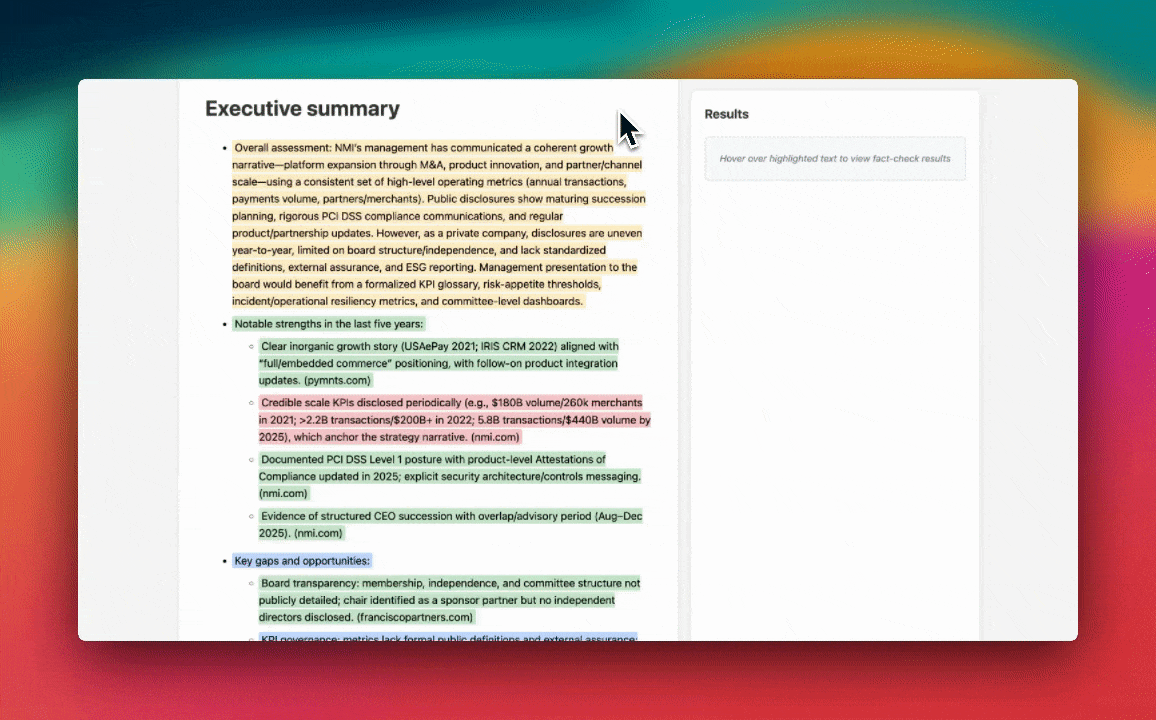How Veridoc Works
Veridoc automatically validates every claim in AI-generated documents against their source materials. Each annotation links directly to the precise backing information, so you can verify findings yourself and make informed decisions about what to trust.
🔍
Robust Claim Decomposition
Automatically breaks content into individual claims at the optimal granularity—detailed enough to catch errors, broad enough to avoid false positives.
🧪
Counterfactual Analysis
Multi-step verification tests each claim against source materials using counterfactual reasoning to identify subtle misrepresentations and logical inconsistencies.
🎯
Adaptive Learning
Learns from your feedback to understand your specific use case's definition of accurate and acceptable, continuously refining validation to match your standards and risk tolerance.
☁️
Flexible Deployment
Seamlessly integrates with DeepResearch platforms and in-house AI services via simple API. Works with both structured and unstructured references—web sources and user-provided data.
Real-World Examples
See how Veridoc helps users identify and understand issues in AI-generated content across critical business scenarios.
📊 Investment Research Conflicts
An AI-generated report on market trends synthesizes information from multiple analyst reports. The AI states that "Tech sector growth is projected at 15% annually."
Veridoc identifies: Source A projects 15% growth, but Source B projects 8% growth. The claim aligns with one reference but conflicts with another. Veridoc annotates in yellow, surfacing both sources so the portfolio manager can assess which projection to trust based on their methodology and track record.
💼 Regulatory Interpretation
A compliance chatbot summarizes GDPR requirements, stating "Companies must delete user data within 30 days of request."
Veridoc identifies: The actual regulation says "without undue delay" with no specific timeframe. The AI added a concrete number not in the source. Veridoc annotates in red as unsupported, linking to the actualregulatory text so the legal team can verify the correct interpretation.
🏥 Clinical Opinion vs. Fact
An AI synthesizes treatment options from medical literature, stating "Treatment X is the most effective approach for this condition."
Veridoc identifies: Source material shows Treatment X has highest efficacy in one study, but the characterization as "most effective" is an interpretation, not a universal fact. Veridoc annotates in yellow as opinion-based, providing links to all relevant studies so clinicians can form their own judgment.
🔬 DeepResearch Hallucinations
A strategic report on AI adoption includes "According to Gartner 2024, 78% of enterprises have deployed AI in production."
Veridoc identifies: The cited Gartner report doesn't contain this specific statistic. The AI hallucinated the number or conflated multiple sources. Veridoc annotates in red as error, noting the statistic cannot be verified in the referenced source.
📈 Financial Data Accuracy
Due diligence report states "Target company revenue grew 40% year-over-year based on Q3 earnings."
Veridoc identifies: The Q3 earnings report shows 32% growth, not 40%. Veridoc annotates in red as factual error, providing the exact page and line from the earnings report showing the correct figure.
💬 Customer-Facing Chatbot
Product chatbot responds "Our Premium plan includes unlimited API calls."
Veridoc identifies: Product documentation specifies "up to 1 million API calls per month" for Premium. The word "unlimited" is an error. Veridoc annotates in red, linking to the pricing page with actual limits, preventing customer service issues.
Exceptional Accuracy
Veridoc's multi-level vetting process delivers the precision enterprises need for mission-critical AI content.
<1%
False Positive Rate
Minimal false alarms mean you can trust the annotations
